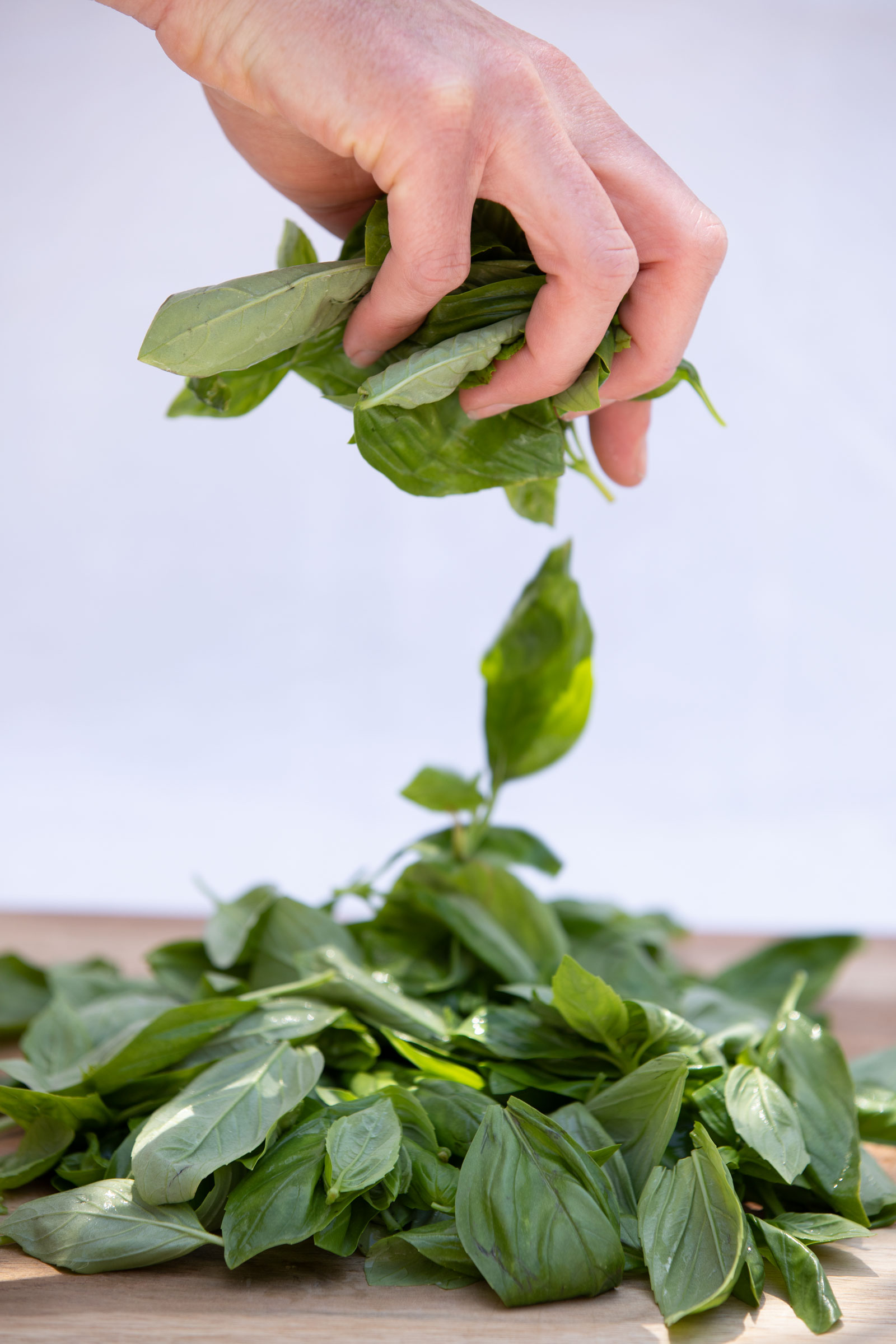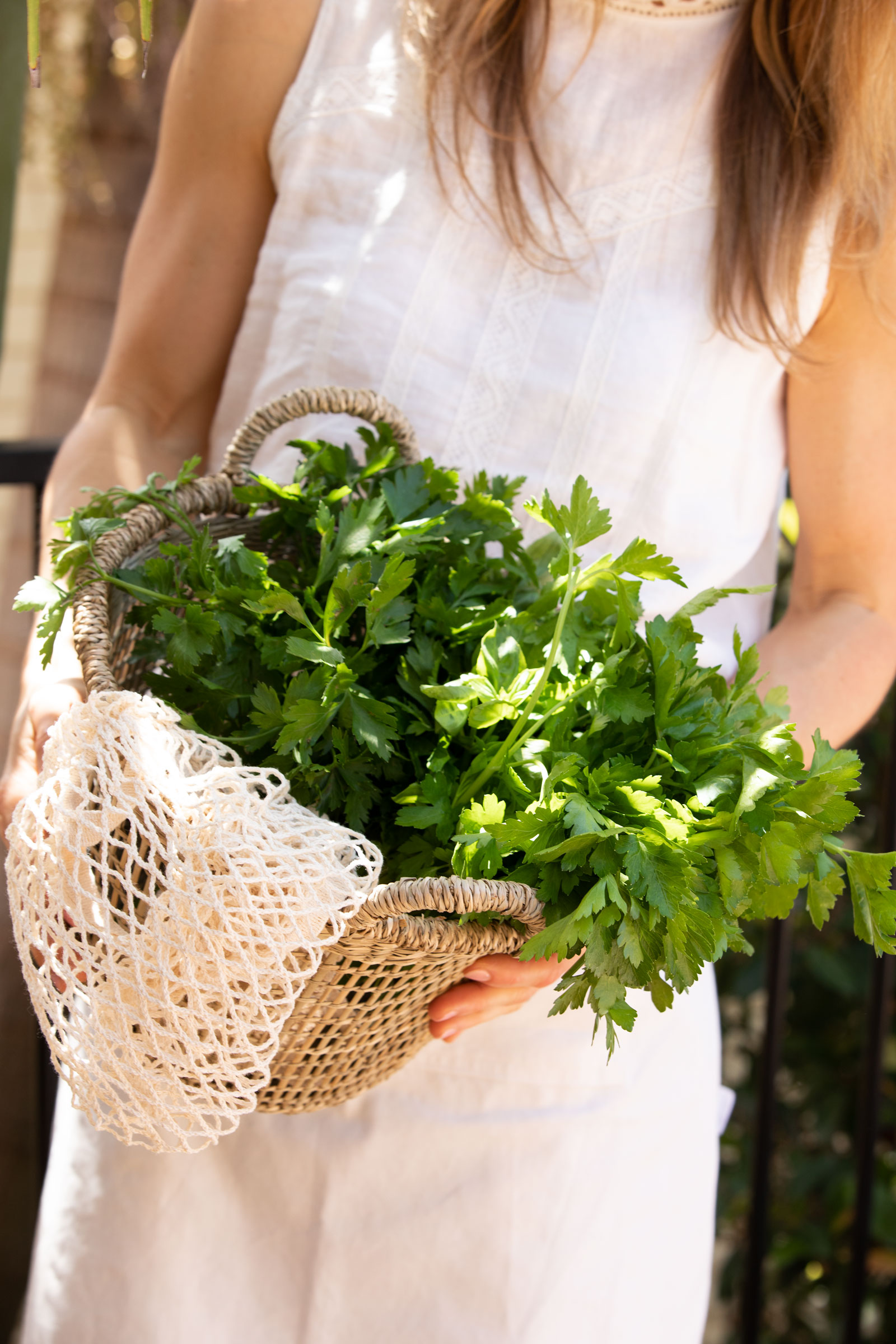Pesto is a fabulous way to increase the nutritional value as well as flavor of your dishes.
I love the vibrant green color and that it is also liked by most children. Having a family, means that it is always of advantage to have dishes that everyone likes. Pesto is easy to make and has so many health benefits due to its ingredients.
Basil is the number one herb used for pesto. It is seasonal in summer and autumn in Australia and is not liked by our friends the mosquitoes. Apparently, they do not like the flavor, so basil would also make an effective mosquito repellent.
Basil is a restorative herb, meaning it can restore our balance, particularly stomach and lung related ailments. Basil can even support the treatment of mild depression, menstrual pain and light headaches. Basil is known for its property to calm the nerves. Based on Hindu belief, Holy Basil or Tulsi, is considered sacred. It would probably be very beneficial for our nervous system if we would all start having more Tulsi tea. Additional benefits of basil are that it aids digestion, is beneficial in the treatment of fever, constipation, insomnia, nausea, fatigue, colds and flus. Knowing that it is a potent anti-parasitique and effective against bacterial infections, will make us add it to our kitchen pantry.
To have an alternative to basil in the summer, cilantro and parsley can both be used in the other seasons. Coriander is an amazing detoxifier and heavy metal chelator (binder). Both cilantro and parsley are a great digestive aid. Beatrix Potter must have even known this, as Peter Rabbit after having overeaten in Mr. McGregor’s garden, ate some parsley to aid his digestion.
Nutritional yeast has an impressive vitamin B content and can mimic the flavor of cheese well and can therefore be used as a vegan pesto. As it can challenge a weak or yeast-infected digestive system, for the yeast free version replace with ½ cup of activated cashews (soak in water for 3 hours with a pinch of salt and wash well before use) or use 2 tablespoons of dry toasted pinenuts.
HERB PESTO RECIPE
INGREDIENTS
1 bunch of basil leaves or 1 bunch of cilantro and ½ bunch of parsley
1/3 cup (55g) of extra virgin olive oil
1 garlic clove, finely chopped
½ cup (55g) of dry toasted pumpkin and sunflower seeds
¼ tsp turmeric powder
¼ tsp kelp powder, optional
2 tbsp of nutritional yeast
Lemon juice from ½ lemon or lime (goes particularly well with coriander)
Sea Salt to taste
Pinch of freshly ground pepper
METHOD
Wash the bunch(es) of herb(s), dry and take the leaves off the stems. Transfer all the leaves into the food processor or high-speed blender. Peel and chop the garlic, followed by toasting the seeds. Add with all the remaining ingredients in your food processor and blend until you have the preferred consistency of your pesto (high speed, Thermomix 10 for 30 seconds), scrape down the pesto with the spatula and repeat the process). Transfer into a glass jar and store in the fridge for up to 4 days or freeze in plastic containers.
REFERENCES
Bower, A., Marquez, S., & de Mejia, E.G. (2016). The Health Benefits of Selected Culinary Herbs and Spices Found in the Traditional Mediterranean Diet. Critical Review of Food Science Nutrition. 9;56(16).
Elmas, L., Secme, M., Mammadov, R., Fahrioglu, U. & Dodurga, Y.(2018)
The determination of the potential anticancer effects of Coriandrum sativum in PC-3 and LNCaP prostate cancer cell lines. Journal of Cell Biochemistry. doi: 10.1002/jcb.27625.
Dhyani, N., Parveen, A., Siddiqi, A., Hussain, M.E. & Fahim, M. (2018). Cardioprotective Efficacy of Coriandrum sativum (L.) Seed Extract in Heart Failure Rats Through Modulation of Endothelin Receptors and Antioxidant Potential. Journal of Diet Supplement. 1-14. 1481483. doi: 10.1080/19390211.2018.
Mahmood, S., Hussain, S. & Malik, F. (2014). Critique of medicinal conspicuousness of Parsley (Petroselinum crispum): A culinary herb of Mediterranean region. Pak J Pharm Sci. 27(1):193-202.
Jayachandran, M., Chen, J., Chung, S.S.M. & Xu, B. (2018). A critical review on the impacts of β-glucans on gut microbiota and human health. J Nutr Biochem. 61:101-110. doi: 10.1016/j.jnutbio.2018.06.010.






